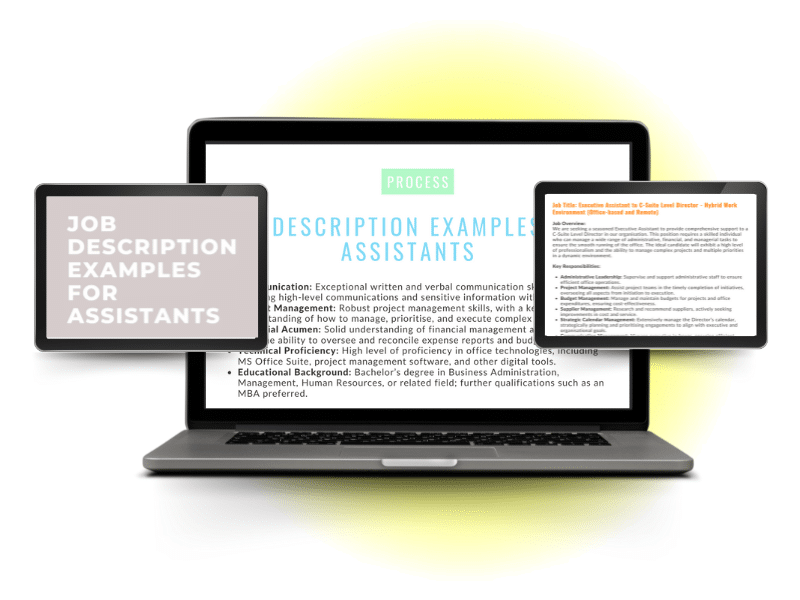Guide for Assistants to Increase Visibility and Influence
In a recent Virtual Summit, Hallie Warner, an amazing speaker and expert on career development for Assistant and Chief of Staff roles, emphasised the importance of building a personal brand for Assistants and other Administrative professionals. Assistants must develop a personal brand to increase their visibility and influence within their organisations, particularly as the business world evolves and changes with new technology and opportunities for Assistants to shine. Along with increasing your visibility in the office, it is also important to create an authentic and consistent online presence that showcases your expertise and thought leadership. It sounds like a lot, so where do you start? Here’s a detailed Guide for Assistants to increase visibility and influence.
Identify your competitive edge
Curate your input
Your thoughts, mindset, and business acumen are heavily influenced by the content you consume. Which means it is really importance to be intentional about what you read, listen to, and watch. By curating high-quality input, you ensure that your output, whether in conversations, social media posts, or professional contributions, is valuable and relevant. Here’s how to strategically manage your content consumption so that when you are in those high-level environments, you feel comfortable and able to contribute to the discussion.
Read widely and wisely
Subscribe to industry-specific newsletters, blogs, and magazines offering relevant insights and updates to your field. For example, sources like the Harvard Business Review or Forbes can provide valuable information if you work in executive support.
Don’t limit yourself to content that aligns perfectly with your current knowledge or viewpoints. Reading widely across different fields and disciplines can offer fresh perspectives that enhance your critical thinking and innovation capabilities. For instance, reading about emerging technologies, leadership strategies, or organizational psychology can enrich your understanding and application in your role.
Identify and follow industry leaders, influencers, and experts on platforms like LinkedIn and X. Their articles, posts, and shared content can keep you abreast of the latest trends and best practices and often introduce you to resources you might not have found otherwise.
Listen to insightful podcasts
Podcasts are a convenient way to absorb information on the go. Select those that cover topics relevant to your career and interests. For example, The EA Campus or The Leader Assistant Podcast can provide targeted insights for administrative professionals.
Listening to podcasts outside your immediate field can spark new ideas and approaches. For instance, podcasts on entrepreneurship, innovation, or productivity, like How I Built This by NPR or The Tim Ferriss Show, can offer valuable lessons that you can apply to your professional growth. Take notes while listening and think about how the insights apply to your work. Consider discussing these podcasts with colleagues or on social media platforms to share your takeaways and engage with your network.
Watch educational videos and webinars
Utilise Platforms like YouTube and LinkedIn Learning. These platforms offer a wealth of free and paid content on various professional development topics. From soft skills like communication and leadership to technical skills like mastering productivity tools, there’s a video or course for nearly every area of interest.
Many industry organizations and thought leaders host current trends and best practices webinars. Participating in these live sessions allows you to learn and provides networking opportunities with other professionals. Comment on videos and ask questions to engage with the creators and other viewers. This interaction can deepen your understanding and expand your professional network.
Surround yourself with knowledgeable people
Being part of professional groups, whether online or in person, allows you to engage with peers who share your interests and career goals. These groups often provide access to exclusive content, events, and discussions that can enhance your knowledge and skills.
Whenever possible, attend industry conferences and workshops. These events are about learning from the speakers, networking, and sharing knowledge with fellow attendees. Regularly discussing what you have learned with colleagues or mentors can solidify your understanding and provide new insights. Consider forming or joining a study group or book club focused on professional development.
Implementing your curated input
Dedicate specific times each week to consuming and reflecting on new content. Whether reading an article every morning, listening to a podcast during your commute, or watching a webinar over lunch, consistent learning should be a regular part of your routine.
Don’t just store the imnformation away, actively look for opportunities to implement new ideas and strategies in your work. Whether it’s a new organizational tool, a leadership technique, or a communication strategy, applying your learnings reinforces the knowledge and demonstrates your proactive approach to professional development.
Sharing what you learn with others is a powerful way to reinforce your knowledge and build your personal brand. Write LinkedIn posts, contribute to discussions in professional groups, or present your insights in team meetings.
Lead upward
As we have said, don’t just store the information away. Being more visible includes sharing what you have learned with others in your organisation and wider network. Proactively sharing valuable content with your leadership team can position you as a thought leader – which is a great place to be for Assistants. Here’s how:
- Identify resources relevant to your Executive and the organisation’s goals. Share these through thoughtfully crafted emails or during meetings.
- Use these resources to identify the company’s pain points or suggest new business ideas.
Schedule your efforts
Lastly, as you are scheduling time to read and absorb new ideas and information, you should also schedule time to share what you have learned. Consistency is crucial for building your personal brand, so make sure you schedule time each week for the following activities:
- Curate Input: Dedicate time to reading and consuming valuable content.
- Engage Online: Answer questions and share insights on social media.
- Create and Share Content: Regularly create and share content with your leadership team and online network.
Remember, building a personal brand is an ongoing process that requires dedication and consistency, but the rewards are well worth the effort. In our Strategic Business Partner Online Course, we cover this and so much more.




